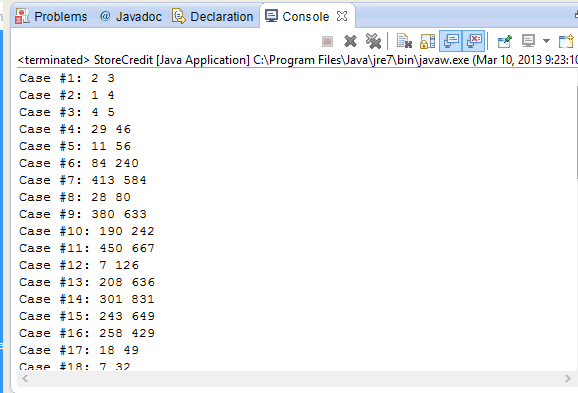I found this question at codejam. You can find the problem here. So let's get on to the problem.
Problem
You receive a credit C at a local store and would like to buy two items. You first walk through the store and create a list L of all available items. From this list, you would like to buy two items that add up to the entire value of the credit. The solution you provide will consist of the two integers indicating the positions of the items in your list (smaller number first).
Input
The first line of input gives the number of cases, N. N test cases follow. For each test case, there will be:
One line containing the value C, the amount of credit you have at the store.
One line containing the value I, the number of items in the store.
One line containing a space separated list of I integers. Each integer P indicates the price of an item in the store.
Each test case will have exactly one solution.
Output
For each test case, output one line containing “Case #x: ” followed by the indices of the two items whose price adds up to the store credit. The lower index should be output first.
Limits
5 ≤ C ≤ 1000
1 ≤ P ≤ 1000
Small Dataset
N = 10
3 ≤ I ≤ 100
Large Dataset
N = 50
3 ≤ I ≤ 2000
Input
3
100
3
5 75 25
200
7
150 24 79 50 88 345 3
8
8
2 1 9 4 4 56 90 3
Output
Case #1: 2 3
Case #2: 1 4
Case #3: 4 5
My Program
import java.io.BufferedReader;
import java.io.DataInputStream;
import java.io.FileInputStream;
import java.io.IOException;
import java.io.InputStreamReader;
import java.util.ArrayList;
public class StoreCredit {
public static Object[] getItems(int items[], int total)
{
ArrayList selectedItems = new ArrayList();
int index = 0;
for (int i = 0; i<items.length; i++)
{
for (int j = i+1; j < items.length; j++)
{
if (items[i] + items[j] == total)
{
selectedItems.add(index, i);
selectedItems.add(index+1,j);
}
}
}
return selectedItems.toArray();
}
public static int[] convertStringToInt(String array[])
{
int intArray[] = new int[array.length];
for (int i = 0; i < array.length; i++) intArray[i] = Integer.parseInt(array[i]);
return intArray;
}
public static void main(String[] args) throws IOException
{
FileInputStream fis = new FileInputStream("StoreCreditLarge.in");
DataInputStream in = new DataInputStream(fis);
BufferedReader br = new BufferedReader(new InputStreamReader(in));
String N = br.readLine();
String line = null;
int caseNo = 1;
while((line = br.readLine()) != null )
{
int credits = Integer.parseInt(line);
int totalItems = Integer.parseInt(br.readLine());
String strItems[] = br.readLine().split(" ");
int Items[] = convertStringToInt(strItems);
Object selectedItems[] = getItems(Items, credits);
System.out.println("Case #"+caseNo+":"+printArray(selectedItems));
caseNo++;
}
}
public static String printArray(Object[] selectedItems) {
String result = "";
for (int i=0; i<selectedItems.length; i++)
result = result +" "+((int)selectedItems[i]+1);
return result;
}
}
Output

History
- 26th March, 2013: Initial version
